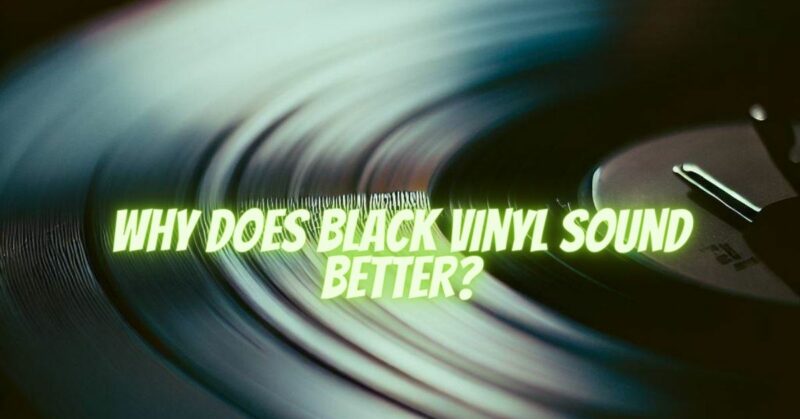Vinyl records come in various colors and aesthetics, but it is the classic black vinyl that continues to hold a special place in the hearts of audiophiles and music enthusiasts. Many claim that black vinyl records offer a superior sound quality compared to their colored counterparts. In this article, we will delve into the reasons behind the belief that black vinyl sounds better, examining the factors at play and exploring the sonic allure that accompanies this iconic format.
- Enhanced Audio Transparency:
One reason often attributed to black vinyl’s perceived superior sound quality is its enhanced audio transparency. Black vinyl records are typically made using a higher-grade vinyl compound, which can result in a more accurate and faithful reproduction of the original recording. This transparency allows for greater detail and clarity, bringing out the subtleties of the music and enhancing the overall listening experience.
- Improved Noise Reduction:
Black vinyl records are also believed to exhibit better noise reduction properties. The darker color absorbs light more effectively, reducing the visibility of dust particles and surface imperfections that can cause pops, crackles, and surface noise during playback. This improved noise reduction contributes to a cleaner, more pristine sound quality, allowing the music to take center stage without distractions.
- Enhanced Manufacturing Standards:
Black vinyl records are often manufactured using higher production standards. Record labels and pressing plants may prioritize black vinyl releases for their flagship or special edition releases, ensuring meticulous attention to detail throughout the manufacturing process. These higher standards can result in improved overall sound quality, including factors such as better centering of the spindle hole, tighter tolerances, and optimized mastering techniques.
- Manufacturing Consistency:
The manufacturing process for black vinyl records often benefits from improved consistency. Vinyl colorants can sometimes introduce variations in the composition and thickness of colored vinyl records, potentially affecting their sound quality. Black vinyl, being a standard and widely used option, benefits from consistent manufacturing practices, resulting in a more uniform product with fewer variations in sound reproduction.
- Psychological Effect and Perception:
It is essential to acknowledge that the belief that black vinyl sounds better may also be influenced by psychological factors and subjective perception. The visual appeal and historical association of black vinyl with high-quality releases and classic albums may create a positive bias that influences the perceived sound quality. The anticipation and excitement surrounding the act of playing a black vinyl record can enhance the overall listening experience.
Conclusion:
While the claim that black vinyl sounds better is rooted in some technical aspects and historical associations, it is important to approach the topic with a balanced perspective. Sound quality is influenced by various factors, including the quality of the mastering, the pressing process, and the playback equipment. Additionally, individual preferences and the listening environment also play significant roles in the perceived sound quality. Whether black vinyl truly sounds better or not, the enjoyment of vinyl records lies in the immersive experience, the tactile nature of the format, and the emotional connection it fosters with the music. So, let’s embrace the beauty of black vinyl and appreciate the magic it brings to our ears and souls.

